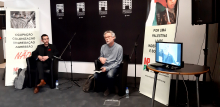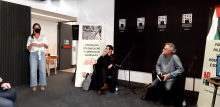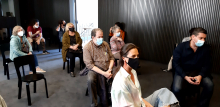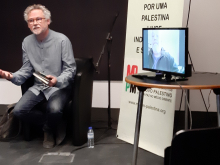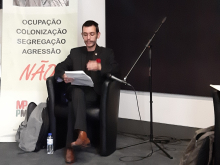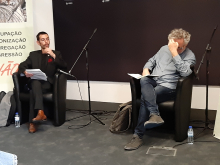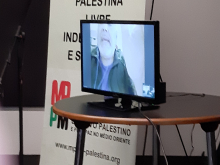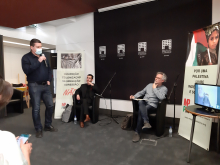Solidarity with Palestinian Prisoners at the Aljube Museum
To mark the Palestinian Prisoners Day, MPPM – Movement for the Rights of Palestinian People and for Peace in the Middle East – and URAP – Union of Portuguese Antifascist Resistants – , with the support of the Aljube Museum (*), promoted, on Tuesday, 20 April, a solidarity session with the Palestinian prisoners and administrative detainees in Israeli jails.
The session was opened by Rita Rato, director of the Aljube Museum, who highlighted the fact that this initiative was taking place where one of the most sinister jails of Portuguese fascism was once located.
Carlos Almeida, speaking on behalf of MPPM, placed the issue of Palestinian prisoners in the more general context of the Israeli occupation, emphasizing that it is an entire people who have their freedom restricted.
Francisco Canelas, representing URAP, recalled the international solidarity Portuguese political prisoners received during the fascist dictatorship and stated that it is our obligation to pay this debt of gratitude by supporting, in particular, the Palestinian prisoners.
Yamil Kasem also participated by videoconference, from Madrid. Kasem, who is a member of the Palestinian National Council and coordinator, in Spain, of the European Alliance in Support of Palestinian Prisoners, described in detail the situation of Palestinian prisoners in Israeli prisons and how this State ignores all the principles of human rights and international law.
This was followed by a period of questions, to which Yamil answered in a very complete and enlightening way.
The issue of the prisoners is one of the central political issues for a just solution to the Palestinian question, along with the end of the occupation of the West Bank and the siege of the Gaza Strip, the status of Jerusalem and the right of return for refugees.
At the end of March, 4450 Palestinians were being held in Israeli prisons, including 140 minors and 37 women. Of the total, 440 are in administrative detention, a practice that allows detention, without charge or trial, extendable indefinitely, and which reminds the infamous “security measures” of Portuguese fascism.
(*) The Aljube was a prison during the fascist regime where political prisoners were detained and tortured. It is now a Museum to remind those days and to honour the freedom fighters against the dictatorship

